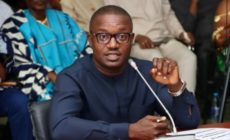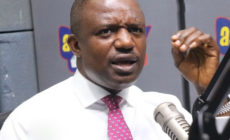ECG begins emergency load managment
- Posted on
- Comment
 Power supply shortfalls from the Ghana Grid Company (GRIDCo) have prompted the Electricity Company of Ghana (ECG) to embark on emergency power management exercise for the past three weeks.
Power supply shortfalls from the Ghana Grid Company (GRIDCo) have prompted the Electricity Company of Ghana (ECG) to embark on emergency power management exercise for the past three weeks.
With no hope of stabilisation of supplies in sight, the exercise is likely to occur anytime GRIDCo prompts the ECG to cut down on power supply to some of its consumers.
According to the Public Relations Officer of the ECG, Mr William Boaterig,the emergency load management had become necessary as the power generators experienced shortages in power supplies from the Bui Generating Plant, as well as the Tema and the Aboadze Thermal plants.
The exercise has so far led to the offloading of between 70 and 200 megawatts of power from the national grid to consumers between 6 p.m. and 10 p.m. on different occasions.
Power management
Following issues such as shortage in crude oil, the plants are said to have developed faults and the companies need to perform maintenance works to prevent a complete breakdown.
Those works, Mr Boateng said, were part of ongoing exercises aimed at protecting transformers from breaking down as a result of excessive load, adding, “These are challenges in the system which are being worked at.”
He gave instances when power outages had been experienced to include Monday, January 20 and Wednesday, January 22,2014 when 70 and 100 megawatts of power respectively were taken off from the national grid.
The ECG, according to Mr Boateng, tried as much as possible to ensure that it alerted its clients before their power was taken off.
He said although tariffs were adjusted at the beginning of the year, the company was still not achieveing full cost recovery, as people were paying far less than what they consumed.
He said with over three million primary customers and an uncountable number of secondary users, the ECG would be able to perform better if it recovered the actual cost of what was consumed by customers.
He said it was the aim of the company to achieve a 100-per cent installation of prepaid meters in all urban centres where it operated, saying presently the prepaid meters covered only 30 per cent of its operating areas.
He said with a mission of providing quality, reliable and safe electricity services to support the economic growth and development of the country, the ECG, which provides power to six regions, apart from the Brong Ahafo, Northern, Upper East and Upper West, was working out a better plan with GRIDCo to ensure that customers were given enough notice before any power management was undertaken.
Mr Boateng’s assertion on cost recovery confirms a recent statement by President John Mahama at the launch of Ghana’s first solar plant at Punga in the Upper East Region that one of the major problems that had created stress for the energy companies was the fact that users of energy were paying less than the energy production cost.
The President was quoted as saying, “If we want reliable power, then, as a people, we must be prepared to pay for it. Our power tariffs have remained at a certain level for the past several years and the problem that we face is that at . the time those tariffs were set, we were using gas to generate the § power. Gas is much cheaper than light crude oil.”
Cost Recovery
Mr Boateng said so far the company, as a result of the prepaid meters that were introduced, especially with the installation of such meters in the ministries, departments and agencies (MDAs), had been able to constantly recover about 30 per cent of the power that it supplied and that, he said, was also helping in reducing the government’s indebtedness to the company.
Currently, he said, the ECG was working at undertaking a final mop- up exercise to ensure that people who did not get their old meters replaced had them replaced with the prepaid meters.
Also, he said by the middle of this year it was going to embark on a project that would see the whole of Kumasi, the capital ofjhe Ashanti Region, put on prepayment.
“The Kumasi prepayment programme,” he said, would also ‘ help the company recover most of its cost.
According to Mr Boateng, the ECG was working at ensuring that GRIDCo and the VRA also put out information to the public on what role they were playing to ensure that the public appreciated the efforts that they were all making to provide power at all times.
Energy needs
With a population of over 25 million people, Ghana has an energy ; supply need of around 2,200 megawatts (MW) plus reserves of about 200MW and, according to the PRO, the country produced around that same figure, saying that “this makes it difficult to sustain constant j power supply when there is a breakdown in any of the plants.”
Energy supply in Ghana
The Akosombo Hydroelectric Power Plant supplies about l,020MW of energy, followed by the Bui Dam, which produces 400MW then the Aboadze Thermal Power Plant, 360MW and the Takoradi Thermal Power Plant 330MW.
Kpong produces 160MW, while the country’s first solar plant at Punga in the Upper East Region produces 2MW of power onto the national grid, giving the country a total of 2,272MW of combined electricity supply.
Thermal power plants to produce 500MW have been installed and inaugurated in Tema at various times. Some of them are public projects, but most of the capacity is private (Sunon Asogli — 200 MW) or semi-private (CENIT —126 MW).
Several thermal generation projects totalling over 1,000MW are currently at various stages of development by both public and private operators.
These projects include Kpone (Alstom), Sunon Asogli Expansion, Takoradi 2 combined-cycle expansion, CENIT/TT1PP expansion and Takoradi 3 expansion.
-Daily Graphic










 (Selorm) |
(Selorm) |  (Nana Kwesi)
(Nana Kwesi)